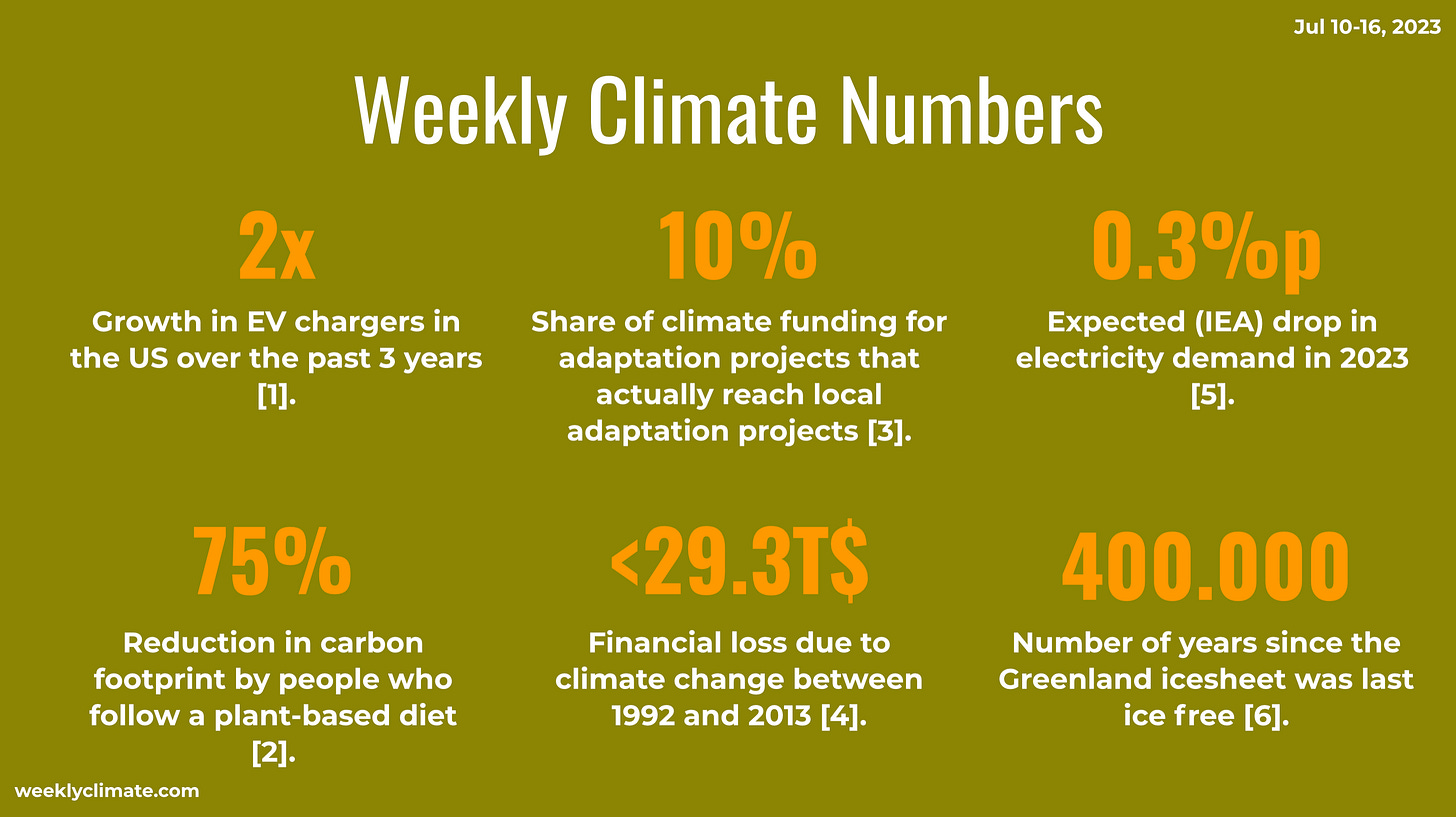THE BRIEF [July 17-23’23]
All our current woes are expected, solutions to extreme heat, global warming is more than just heat and fossil gas lobbyists caught with more propaganda campaigns.
Welcome to this week’s edition of The Weekly Climate 🎉
References: [1], [2], [3], [4], [5] and [6].
If you’re only getting The Brief but want to get the full version of the newsletter be sure to upgrade your plan to paid. Check out the preview that you will receive to see why more than 30 people think it’s worth paying for. And see a recent week’s full newsletter for details for why I decided to go paid.
If you’re getting both: Thank you so much for deciding to upgrade to go paid 🙏. And thanks to everybody for reading my newsletter regardless of which version you read 🤗.
‼️News you can’t miss
Here’s one important scary/bad (🙀), good (😻), interesting (😼) and fossil (💩) news item.
🙀 Our problems with heat and flooding are all expected according to the climate scientists
😻 Heat is a problem but there are lots of solutions
😼 Global warming is bringing more than just extreme heat
💩 Gas lobbyists in the UK and US have been found to launch propaganda campaigns against heatpumps.
This week’s highlights
[#heatcoal] — China is increasing its use of coal to generate electricity, despite pledging to reduce carbon emissions. China emits almost a third of all energy-related greenhouse gases and burns more coal every year than the rest of the world combined. China's ability to ramp up coal use is due to a national campaign to expand coal mines and build more coal-fired power plants. While China leads the world in installing renewables, it is doubling down on coal for reasons of energy security and domestic politics. The country has more than 300 coal-fired power plants in various stages of proposal, permitting, or construction, contributing to the building boom.
[#drought] — Spain is turning to a network of irrigation canals built by the Moors in the Middle Ages to mitigate drought caused by climate change. The canals, called "acequias," slow down water flow from the mountains to the plains, retaining and distributing it to irrigate crops during the dry season. Many acequias fell into disuse in the 1960s, but they are being revived as a low-cost and effective solution to drought. The biggest challenge is preserving the ancient knowledge and traditions behind the system.
#heatwork] — Extreme heat is affecting workers around the world, causing health problems and reduced productivity. Heat is also becoming an issue for labor organizers, who are pressuring companies and governments to protect workers from extreme heat. Very few countries have regulations to protect workers from extreme heat, but there are solutions that can help, such as allowing workers to take breaks when they need to and providing plenty of water and shaded areas.
[#economicfallout] — Extreme heat caused by climate change can have long-term negative economic impacts, including reduced labor productivity, crop damage, increased mortality rates, disrupted global trade, and decreased investment. Climate-related disasters have put added pressure on public spending, and economic losses related to climate change are expected to significantly increase in the future, according to estimates from the European Union. The cost of each climate-related disaster has increased nearly 77 percent over the past half century, and one study found that the cumulative loss between 1992 and 2013 reached between $5 trillion and $29.3 trillion globally.
That’s it for this week folks!
If you want more details or simply think my newsletter rocks remember that you can always go paid to get the full version of the Weekly Climate. But before you do, ask yourself this question: Does it provide you with 1.25$ worth of value every week? Obviously I think it does. In fact I really hope that just the time alone I save you should easily cover those 1.25$. Don’t hesitate to ping me on michael@weeklyclimate.com or comment below with any questions, feedback or comments regarding this.
Remember if you’re feeling down, angry or sad from some of the news in this newsletter one cure is to act. And one way you can always act that also happens to be one of the most powerful things you can do is to talk about it. That also works if what you just read made you hopeful or happy btw.
If you enjoyed this newsletter don’t forget to share it with your friends, coworkers or other people you think could benefit from getting it. If you got directed here by a friend or another link on the Internet don’t forget to subscribe!
See you all next week 👋


